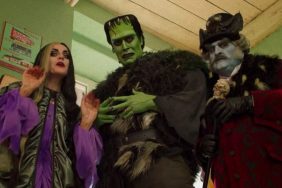The Possession is about a family that finds a Dibbuk box that possesses their daughter. Seeing the film I was reminded of the development of a film called Dibbuk Box. That’s this film, it’s just called The Possession now. We chatted with director Ole Bornedal about the exorcism tale based on Jewish mythology, and got some info on his mysterious past projects.
CraveOnline: This project started with the name Dibbuk Box which is the item in the film. What did you think of the change to The Possession?
Ole Bornedal: I think there’s a lot of people who had difficulties remembering Dibbuk Box. There were some discussions about the title was [too difficult]. There are people who are going to sell this movie and what they say, they’re more clever at doing that business than I am so it’s not one of my battles.
What do you think of this timing where there’s always been possession movies but in the last two years there’ve been a lot more?
Yeah, I think it’s a discussion of what evil is and perhaps it’s kind of a climax of what the world had been experiencing over the last years here. What is evil and where does evil come from? Perhaps it’s a part of the big cultural discussion, I don’t know. I think that evil is not an external force. I think evil is an internal force and I think what makes it interesting for me to watch The Possession is again it’s a discussion about what evil is. Is the box an exterior box or is the box actually a symbol of what we all carry inside of ourselves and we should always fight the temptation of opening that box? I don’t know. I’m not a philosopher.
Sounds like you are!
As a fellow man on this planet, I would say I think evil is fascinating and we’re fascinated by trying to explore what this thing is about.
I love that they took Emily for all this medical analysis because my favorite part of the book The Exorcist is when they tried to find a medical explanation. Of course that was hardly in the movie version, so did you want to explore how real people would try to find a medical solution?
No, not really. I’ve never read that. To be honest I’m really not that interested in exorcist horror or such. I thought the screenplay was really interesting. It was challenging for me to do a genre film in the U.S. with perhaps the one of strongest film genres in the U.S. is the horror movie. It was challenging for me to work on that. I concentrated on the screenplay and first and foremost, I concentrated on trying to see what I could do to bring real character up on the screen, really work with the personalities of the actors, work with the psychology of the characters and create real people up there.
Is part of that including something medical because that’s what real people would turn to?
Yeah, that is what they’re doing. They’re going to the MRI and trying to find out what’s wrong with her body. I guess they are doing what normal people would do, aren’t they?
Was your studio experience on The Possession better than your experience on the Nightwatch remake?
[Laughs] Yeah, much better. It’s some years ago. I’m not sure I even remember at all from the Nightwatch years. Perhaps I just suppressed it all and it’s somewhere in my neurotic dreams. But no, it was definitely easier and Sam Raimi is a great producer. You know, he’s a filmmaker himself. I agree with you. I don’t know if I agree with you but I sense that I agree with you that there are a lot of producers out there that are quite difficult. But working with a film producer that’s also a filmmaker makes it easier to win the soft choices. He could feel, he sensed where I wanted to go with this film, trying to make it more human than just plain scary. So it was a pleasure working with Sam on the film.
Scaring audiences is one thing. How do you scare Sam Raimi?
I don’t know. He actually told me I scared the sh*t out of him in some of these scenes here. I don’t know. The thing is when you’re a filmmaker yourself and you do the stuff yourself you’re not easily scared any longer. The problem of being a filmmaker is that I know all the tricks. I cannot really watch any movies any longer and get really scared, but I hope I scared Sam. That would be an honor for me to.
Were you excited to make a rabbi look like a badass?
Do you think he’s a badass?
Yeah, when he dons that tallis it’s like he’s suiting up for battle.
[Laughs] Oh, I didn’t see him as a badass. Yeah, perhaps he is. Matisyahu, he’s real. He was a good choice in the role. He’s not an actor but I think again, what this film is trying to do is trying to bring real character to the screen and real people up on the screen and Matisyahu is definitely the real thing. He knew all the rituals. I really couldn’t direct him. I couldn’t really tell him anything of what to do. He knew it by heart.
What is your philosophy on lighting and sound design?
That the picture needs to be as organic as the characters on screen. Moviemaking is telling stories about people, real people and humanity. The pictures and the lighting should be just as vibrant, just as alive as the characters.
Is part of that enhancing some of the sounds to make them louder and controlling some of the lighting?
Yeah, everything is manipulation of course and the sound is important. I work a lot on the sound. My first background in the medium was working on radio features. The aesthetics, the sound and the music is perhaps the most prominent in my post work on the movie. I spend a lot of time in that. I know a lot of secrets that I’m trying to invade into the minds of the audience.
What was your collaboration with the visual effects artists to make shots like the fingers coming out of the throat?
Well, that was my idea. I always wanted to see that. I think it’s pretty cool. I don’t like to see small kids being hurt of course. I actually hate that in movies but in this case, the story’s so grotesque so I felt it was justified.
What’s next then, another Hollywood movie or back to Europe?
Hopefully both. I’m looking at some Hollywood scripts right now that are quite interesting. I’m working on a big epic love story war movie. It takes place in 1864 in the great wars between Denmark and Germany. That’s a huge project, but it’s a love story. Luckily, it’s a love story. No more demons the next couple of years.
Even the Hollywood scripts are different genres?
Yeah. No more demons.
Can we find your film The Masturbator on DVD?
[Laughs] No, I don’t think you can. I think that’s a deep secret. I think it’s on IMDB somewhere on my CV but I think it’s somewhere in the archives in the National Danish Broadcasting television system somewhere.
Was it as good as it sounds?
Yeah, it’s pretty good. It’s pretty awesome. I actually saw it again. It’s a gruesome, black, many many years before David Fincher’s Se7en. I just saw it recently and said, “Oh, that’s the same kind of lighting, the same kind of atmosphere as Se7en.” It’s surreal and it’s perverse so it’s probably a good thing that you can’t get it on DVD. It’s better kept as a secret.
I want to see The Substitute and I Am Dina. Are those good choices for your previous movies?
Yeah, I think so and you should watch Just Another Love Story.







